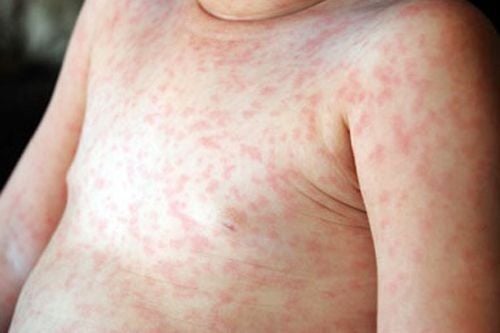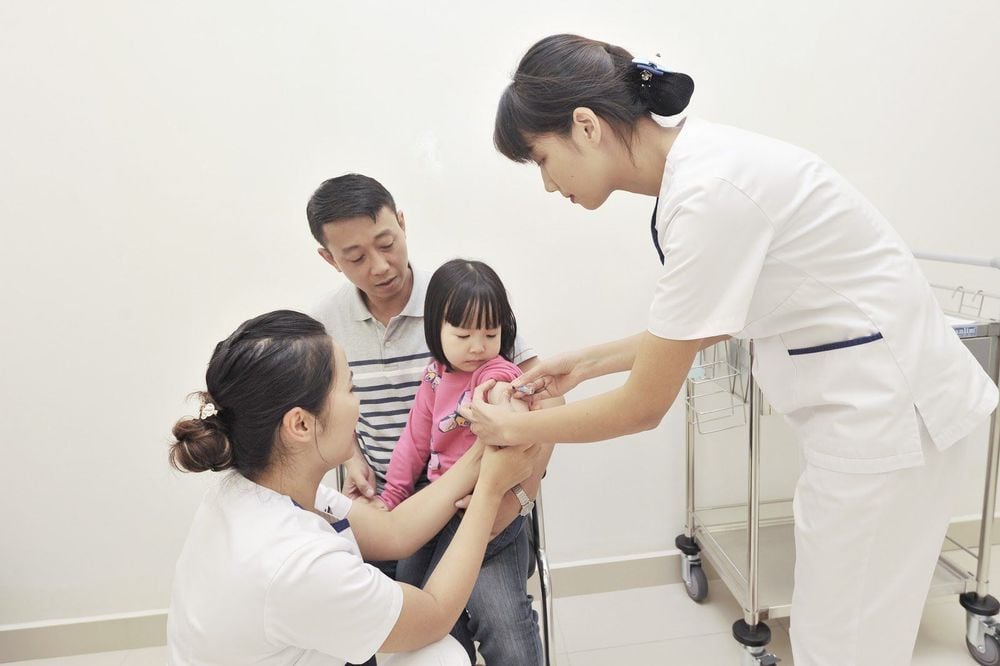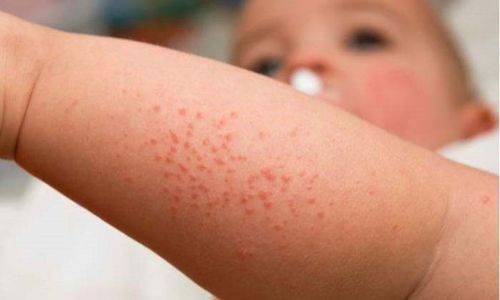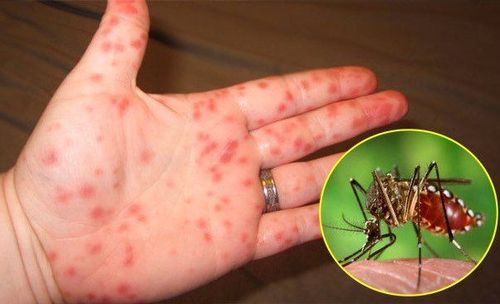This is an automatically translated article.
The article was professionally consulted by MSc Nguyen Thi An - Department of Pediatrics - Neonatology, Vinmec Ha Long International General Hospital.Measles is a highly contagious disease with a high probability of becoming an epidemic. When the disease is not properly treated, the patient can easily lead to dangerous complications. The worrying thing is that measles is not only present in adults, most cases are measles in children, many children are not old enough to be vaccinated.
What is measles?
Measles is an infectious disease that spreads easily through the air caused by the measles virus. This is a virus of the family Paramyxoviridae, spherical shape, 120-250nm in diameter, weak endurance, easy to kill with common disinfectants or sunlight, heat... with a temperature of about 56 degrees Celsius The disease usually occurs in winter and spring and is common in children under 5 years of age with symptoms such as fever, rash, runny nose, cough, red eyes... Measles is less fatal but can also be fatal. can cause many complications such as: otitis media, pneumonia, diarrhea, corneal ulceration and sometimes encephalitis after measles, especially in malnourished children...
Measles is less fatal, but It can also cause many complications such as: otitis media, pneumonia, diarrhea,... Measles virus has two antigens:
Red blood cell agglutination antigen (Hemagglutinin). Hemolysin: When the virus enters the patient's body, it will stimulate the production of antibodies. Antibodies appear from 2 to 3 days after the rash develops and persist for a long time. Immunity in measles is sustained immunity.
Trắc nghiệm: Bạn có phân biệt được chính xác cảm lạnh và cúm mùa?
Cảm cúm và cảm lạnh là hai khái niệm mà chúng ta thường đánh đồng nó giống nhau, không phân biệt rõ ràng. Dưới đây là một số câu hỏi trắc nghiệm, giúp bạn có thêm những kiến thức phân biệt cảm lạnh và cảm cúm. Từ đó, có những biện pháp điều trị bệnh phù hợp.Measles transmission route
Many questions arise, is measles contagious? The answer is that measles is highly contagious with about 90% of people in contact with the patient will catch measles if not vaccinated.
Measles is transmitted through the respiratory tract: The measles virus is present in the nose and throat of the patient. They are usually already able to infect others 4 days before the redness appears. Measles is spread directly when an infected person coughs, sneezes, or talks: When an infected person coughs, sneezes, or talks, tiny droplets containing the virus are released into the air and can be inhaled or inhaled by others. These droplets can fall on some places such as a table top, a phone... When a person who is not sick touches these places and puts their hands on their nose or mouth, they will get sick. Indirect transmission: This case is rare. encountered by the measles virus that is easily killed in the outdoor environment. Once the measles virus enters a patient's body, it usually grows into the cells at the back of the throat and lungs. The disease then spreads throughout the body including the respiratory system and skin.

Khi siêu vi sởi vào cơ thể bệnh nhân, chúng thường mọc vào trong những tế bào đằng sau cổ họng và phổi. Sau đó lan khắp cơ thể kể cả hệ hô hấp và da
Symptoms of Measles
The symptoms of measles in children and adults are both fever, upper respiratory tract infection, conjunctivitis, and rash. When the disease is severe, it can lead to many complications: pneumonia, encephalitis, otitis media, keratitis, diarrhea, death... Measles usually progresses through the following stages:Incubation stage: 7 - 21 days, average 10 days Inflammation phase (inflammation phase) 2 - 4 days: high fever, upper respiratory tract infection, conjunctivitis, sometimes acute laryngitis, possibly Koplik's granules inside the mouth across the upper jaw. Full-blown stage 2-5 days: After 3-4 days of fever, the patient develops a red, burning rash from behind the ears, forehead, chest, back, and finally down to the thighs and feet. Recovery phase: The pale rash turns gray, scabs leave dark spots, tiger stripes and fades
Measles complications
Measles is a benign disease, but if not detected and treated promptly, it is easy to encounter the following dangerous complications:Respiratory complications: Laryngitis, bronchitis, bronchopneumonia Neurological complications: Encephalitis, acute myelitis, meningitis Gastrointestinal complications: Oral mucositis, Ear - nose - throat complications: Superinfectious nasopharyngitis, otitis, mastoid otitis.
Measures to prevent measles
Immunize 2 doses for children of vaccination age, 1st dose from 9-12 months old, 2nd dose from 18-24 months old.
Isolation of sick people and personal hygiene :
Use N95 masks for patients, caregivers, medical staff Isolation time from the time of suspected measles to at least 4 days after the rash develops Increased hygiene multiply, disinfect the nose and throat, keep warm, improve physical condition.

Tiêm chủng 2 mũi cho trẻ độ tuổi tiêm chủng, mũi 1 từ 9 – 12 tháng tuổi, mũi 2 từ 18 – 24 tháng
Please dial HOTLINE for more information or register for an appointment HERE. Download MyVinmec app to make appointments faster and to manage your bookings easily.













